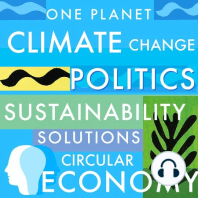20 min listen

Highlights - Kevin Trenberth - Nobel Prize Winner - Author of “The Changing Flow of Energy Through the Climate System”
Highlights - Kevin Trenberth - Nobel Prize Winner - Author of “The Changing Flow of Energy Through the Climate System”
ratings:
Length:
13 minutes
Released:
Jul 25, 2022
Format:
Podcast episode
Description
"I think certainly we're going to go through 1.5 degrees Celsius. I think the best estimate is probably somewhere around 2032 or thereabouts, the early 2030s. And at the current rate we're going, we'll go through 2 degrees Celsius in the mid to late 2050s. Now there's certainly time to slow that rate of increase down, and we could easily push the 2 degrees Celsius threshold out to 2070 or 2080. And with really strong efforts, we might be able to hold the overall global mean surface temperature increase to something maybe close to that. Although, whether it goes past it and then comes back a little bit to it, remains to be seen. So this relates to current policies and what nations are committed to doing.Certainly, if everyone's current policies and what they're committed to doing were in place, we would be in a much better situation than we actually are because a lot of those policies have been mentioned, but there are no implementation plans in many countries. There was a recent report I saw, which said that maybe two countries in the world, out of 190 something countries, are maybe on track to meeting their obligations on the COP26 meeting in Glasgow last year.”Kevin Trenberth is a Distinguished Scholar at the National Center of Atmospheric Research (NCAR) in Boulder and an Honorary Academic in the Department of Physics, Auckland University in Auckland, New Zealand. From New Zealand, he obtained his Sc. D. in meteorology in 1972 from Massachusetts Institute of Technology. He was a lead author of the 1995, 2001 and 2007 Scientific Assessment of Climate Change reports from the Intergovernmental Panel on Climate Change (IPCC), and shared the 2007 Nobel Peace Prize which went to the IPCC. He served from 1999 to 2006 on the Joint Scientific Committee of the World Climate Research Programme (WCRP), and chaired a number of committees for more than 20 years. He is the author of "The Changing Flow of Energy Through the Climate System".The Changing Flow of Energy Through the Climate Systemwww.ipcc.chhttps://www.cgd.ucar.edu/staff/trenbertwww.oneplanetpodcast.orgwww.creativeprocess.info
Released:
Jul 25, 2022
Format:
Podcast episode
Titles in the series (100)
(Highlights) ALICE SCHMIDT: Interviewed by Mia Funk · Associate Podcast Producer Marley Hinschberger by Sustainability, Climate Change, Renewable Energy, Politics, Activism, Biodiversity, Carbon Footprint, Wildlife, Regenerative Agriculture, Circular Economy, Extinction, Net-Zero · One Planet Podcast